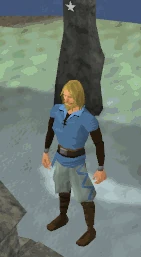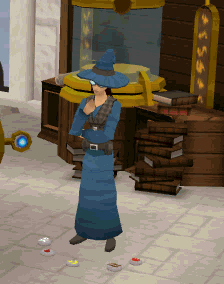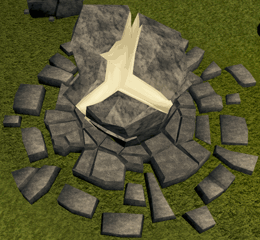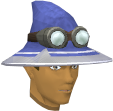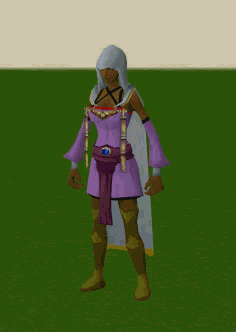| Also known as | RC, Runecraft |
|---|---|
| Release date | 29 March 2004 (Update) |
| Members only | No |
| Minimum level for Hiscores |
15 as of 12 Dec 2017 |
| Players with 99 |
105,350 as of 4 Feb 2023 |
| Players with 120 | 2,380 as of 4 Feb 2023 |
| Players with 200M XP |
793 as of 4 Feb 2023 |
Runecrafting is a free-to-play skill released with RuneScape 2 allowing players to craft runes for Magic spells at Runecrafting altars. Runecrafting was accidentally discovered by a Fremennik, which eventually led to a split in their society. It is classed as an artisan skill and its symbol is a slab of essence being stricken with magic. It is mainly trained by crafting runes at an altar using essence. Alternatively, runecrafting in the Runespan provides another training method, but the runes created cannot be kept.
Since the release of the Runespan, the amount of players who have achieved 99 Runecrafting has more than doubled. Because of this, Runecrafting has gone from being the rarest level 99 to currently being the sixth rarest level 99 (Divination being the first).
The current minimum requirement to be ranked (at approximately rank 917,728) on the hiscores for Runecrafting is level 15. As of 04 February 2023, there are 105,350 current members that have achieved level 99 in Runecrafting. There are 2,380 current members that have achieved level 120 in Runecrafting.
History
Origins
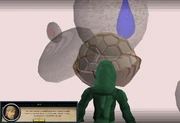
Guthix creates the first runestones, earning Gielinor its current name.
When the humans first came to the realm of Gielinor through the World Gate in the First Age, Guthix created Runestones, allowing the humans and other sentient races to practice the Magic arts. These runestones were created by Guthix using an ancient artefact called the Stone of Jas, which he found on Gielinor when he arrived. Missionaries such as Misalionar spread these runes around Gielinor for people to use, earning the planet its nickname RuneScape, which fell into common use, while 'Gielinor' became obsolete. The runestones were stored in deposits, some of which still exist today.
In the Second Age, the humans continued and expanded the practice of magic. However, the runes that Guthix had provided began to dwindle and became a much sought after commodity. Many mages such as Dahmaroc had to fight each other for runestones. During one such fight, Dahmaroc was turned into stone himself, becoming what he once sought after so much. The exception to this was the Moon Clan, who had continued to practise magic, becoming so proficient that, over the centuries, they would even become able to use it without runestones.

V finds and touches the Stone of Jas, being enlightened, and discovers the Rune essence.
During the First or Second Age, a Lunar seer known as V------- discovered the Stone of Jas embedded in a large rock inside a cavern, leaking magic into its surroundings. Thus the rune essence had been created, and, travelling around RuneScape building altars at locations with a high concentration of certain runic energies, V and his followers allowed the Moon Clan to craft the runes themselves. And so the art of runecrafting was born. The other Fremennik saw this as outright blasphemy, believing that runecrafting was a privilege of the gods, which led to a deep schism between the tribes. The Moon Clan, having constructed the runecrafting altars, which soon collapsed upon themselves due to the high amounts of runic energies, thus forming pocket dimensions, retreated to Lunar Isle where they practised their craft, while the other Fremennik remained on the mainland and its surrounding islands, abstaining from magic altogether.
By the time of the Fourth Age, the runestones that had been given by the gods had all but depleted due to the heavy use of Magic during the God Wars. The art of magic faded with the supply of runes, until it became a very rare art.
Rediscovery
In the year 2000, however, humans rediscovered magic when the Rune Essence mine was discovered in the frozen wastes to the north, where the Stone of Jas had once rested. By bringing Rune Essence to the altars around RuneScape, runestones could be created. Thus the mainland regained access to runecrafting and magic after millennia, allowing humans to dominate the various other races and ushering RuneScape into its Fifth Age. As King Botolph Remanis of Misthalin declared: it was the Age of Man. Institutes devoted to its study and practice were erected, most notably the Wizards' Tower, the Mage Training Arena and the Wizards' Guild, a relic from the First Age.
The Fremennik claimed that magic belongs only to the gods, and were angered by the now widespread art of Runecrafting. A particularly offended tribe led by Chieftain Gunnar split off in the year 42 and initiated what is known today as the Runecrafting Crusades, roaming the human kingdoms and destroying the temples to the altars erected by V and his followers. The crusades would last twenty years and see the destruction of the Mage Training Arena and the legendary hall of Camdozaal in addition to the accessible altars, and claim the lives of many wizards and 'barbarians', as the Fremennik were derogatorily called. The Misthalanian wizards eventually managed to halt the invasion on the western bank of the River Lum, where the Fremennik settled in a village that would eventually be named Gunnarsgrunn in honour of their chieftain, planning future invasions. Whilst they had not eradicated magic, they had succeeded in stealing the majority of the wizards' supplies of rune essence, and some of the tribe came to guard it in the Mountain of Fire deep in the Wilderness, doomed by their oath to protect it to a half-life as lepers, 'The Untainted'. Seeing that wizards (with the exception of the Moon Clan) still had to trek to the far awar rune essence mines by foot or sea, this spelt problems.

The Wizards' Tower today, founded on ruins of conflict and strife.
Some eight years later, in 70, some members of the Wizards' Tower discovered how to solve the teleportation problem by routing teleports through another plane: the Abyss. This would allow them to create new teleports and thus teleport directly to the Rune Essence mine from anywhere in the world, which would greatly increase rune production. However, there was an internal disagreement over exactly who should get the credit for the discovery, and the source of the actual spell, a Zamorakian demon known as Azacorax, was unacceptable to the Saradominist Blue Wizards. The members of the Blue Order the ritual to create a teleport "anchor" mid-casting, which caused a fire which utterly destroyed the tower, a catastrophe blamed in later years on the Zamorakian Red Order. The only survivors of the fire were Perien the Blue and Kelavan the Red, the latter of whom had actually discovered the solution to the teleportation problem. Perien founded a new Wizards' Tower on the ruins of the old one, and became its first Archmage. Due to what had happened to the first tower, which had been a collaboration between followers of many gods, Archmage Perien restricted access to the tower to Saradominists only, and started teaching the teleport spell to the Rune Essence to only a select few people so that the Essence didn't fall into the wrong hands.
While the new Wizards' Tower prospered, the Zamorakian resentment grew. Likewise, society responded with extreme anti-Zamorak sentiment. Whilst this had always been present in a mild form due to the god's chaotic and destructive teachings, it now erupted in full. The wizard order of the Dagon'hai was evicted from Varrock with much bloodshed, and in Asgarnia the Kinshra, an order of knights that had hitherto ruled the kingdom alongside the White Knights, were likewise exiled from the capital Falador and stripped of political powers. Kelavan founded the Sacred Order of the Staff of Fire, an underground organisation seeking vengeance on the Blue Wizards, while the Zamorak Magical Institute was founded to research runecrafting and magic outside the tower and obtain the closely guarded secret of teleportation and the Abyss.
Modern developments
Meanwhile, in the new Wizards' Tower, the Runecrafting Guild was founded by Wizard Elriss, located in a realm of the Runespan. There, researches devoted themselves to the study of runecrafting, attempting to learn its many secrets. The guild remains one of the most prestigious and advanced scientific institutes to this day. The Runecrafting Theory Journal contains the various runecrafters' exploits in their search for knowledge.
In 165, just after the Second Battle of the Salve that finally put an end to that year's Zamorakian Insurrection orchestrated by the vampyre noble Tenebra, who was after the Misthalanian throne, the essence caches at the Mountain of Fire were raided by Melville Grayzag and other wizards, reclaiming what had been stolen from them a century ago. Its present guardians were wiped out, while the rest of the Untainted, located elsewhere at the moment, returned to see their settlement in ruins. The matter would be legally resolved in the Seers' Village Courthouse some four years later, when the Gunnarsgrunn Fremennik fought in a court case against the wizards of the Tower.
Also in 169, the ZMI finally obtained access to the Abyss, launching Operation: Transient, and began crafting runes at the mysterious Ourania Altar in Kandarin. That same year, a young researcher known as Wizard Finix put forward his theory that the runecrafting altars do not contain infinite energy and will one day run out. With nobody able to disprove him, Elriss opened up more of the Runespan with the purpose of studying its pure runic energies to test Finix's theories. In the Runespan, essence is obtained in floating rocks and in the local 'fauna' (semi-sentient beings made entirely of runic energy), as opposed to that mined at the Rune essence mines, and the runestones created from it look different from conventional ones.
The last major development in the art of runecrafting that year was the settlement of differences between the mainland Fremennik and the Moon Clan. The Fremennik Chieftain Brundt sent one of his tribesmen, a former outerlander, to Lunar Isle to serve as diplomat, which eased tensions between the two. A few months later, following the start of the Sixth Age, V, the erstwhile discoverer of runecrafting, returned to RuneScape, having become a god himself due to his interaction with the Stone of Jas. Following a celebration of welcome, the hero was slain by the Dragonkin, leaving all of the Fremennik to mourn him together. V's lingering power spread around the world and slightly boosted the performance of all wizards crafting runes.
Essence
In order to craft runes, players first need blank rune stones called 'essence'. There are two main types of essence: Rune essence and Pure Essence, both of which are unstackable. A third type of essence, unstable essence, however, is stackable. They are most commonly referred to simply as 'Ess.' Several other common slang names include 'Pures,' 'P ess', 'Pure ess,' and 'Rune ess.'
Rune essence
Rune essence is dramatically limited in its potential on members servers. It is only capable of being bound at altars available to non-members - into Air, Mind, Water, Earth, Fire, or Body runes. You will be unable to craft member's runes such as Chaos or Nature. This form of Rune Essence is often called "normal essence" or "regular essence" to distinguish it from Pure essence. It requires only level one in mining to mine.
Pure essence
Pure essence can be used in the creation of any and all kinds of runes. This kind of essence, however, is the only kind of essence that can be used to craft certain kinds of catalytic-style runes; namely Cosmic, Chaos, Astral, Nature, Law, Death, Blood, and the various combination runes such as Steam Mud, Lava, and Dust runes. (It may, of course, still be used to craft all of the runes a player may craft with rune essence.) Runes crafted at the Ourania Runecrafting altar must also be made with pure essence. In order to mine any amount of Pure Essence, a player must be a Member with at least level 30 Mining and have access to the Essence Mines.
Unstable essence
Unstable essence, unlike the former rune and pure essences, is the only kind of essence which is stackable in the inventory outside of Daemonheim. It may be obtained exclusively as a reward from Wizard Rinsit in exchange for Runespan points, at a rate of 200 essence per 500 Runespan points. When used while imbuing runes, it is consumed at a rate of 10 unstable essence per action; granting the same amount of experience per essence as a player would receive while crafting runes with pure essence. Unlike rune or pure essence, however, crafting runes with unstable essence yields no runes - only Runecrafting experience (albeit at an enhanced rate, due to consuming ten essence per action).
Obtaining essence
There are multiple ways to obtain rune essence or pure essence. These include trading with other players and purchasing from the Grand Exchange, mining it, monster drops, rewards from the The Great Orb Project, and the daily reward from the Ardougne Tasks or wicked hood, as well as accessing Archmage Sedridor's personal rune essence chest, provided that the quest Rune memories has been completed.
Runespan Essence
In the Runespan, a different form of Rune essence is utilised. It has jagged edges, unlike its siblings in Gielinor. It is obtained by catching some that is floating about in the runespan, 'chipping off' from an animal or from siphoning all the elemental energy from an animal. Runes crafted from this essence cannot be used to cast conventional magic, and are converted into points as a player leaves the Runespan.
Altars
At altars, blank rune essence is transformed into Runes by binding the energies of the altar into the runestone. Tiaras, Talismans or Talisman staves are needed to enter altars hidden inside 'Mysterious ruins'. There are a couple of exceptions to this e.g. the astral altar.
Mysterious ruins
A Mysterious ruin is a large, glowing stone slab surrounded by pillars. They are essentially doorways used to travel from Gielinor to the pocket dimension at which runecrafting actually takes place. Entry to each altar requires a specific talisman, tiara or talisman staff which functions as something of a key or trigger which transports the player to the altars. (shown below). By 'Using' a talisman on a Mysterious ruin, players will be transported directly to the runecrafting altar within a landscape related to its theme. Other ways to enter involve wielding a staff or tiara, saving one inventory space. A small portal on the floor near the altar provides transportation back to Gielinor.
Both the Ourania and Astral altars can be accessed without use of a talisman or related accessories. These two altars have no Mysterious Ruins at their entrance, instead being simply the altar itself.
There is one alternative method to gain access to all but the Ourania and Astral altars directly, circumventing the mysterious ruins entirely, via usage of the Abyss.
The Runecrafting banner at the GE near Murky Matt
Entering altars
To enter a Runecrafting Altar you must have either a Talisman that matches the current altar you are trying to enter (or Omni-Talisman for Lv. 50 and above), then click Use and then on the Altar. Alternatively you can use a Tiara or the Wicked Hood infused with the power of a Talisman (this can be done inside the altar with a plain Tiara and the Talisman you used to enter the altar or by using them on the hood). The Tiara or Wicked Hood is recommended because equipping it saves an inventory space. It allows entry into the Altar with one click. Altars can also be teleported to through the special ability of the Wicked Hood and/or using pre-made teleport tabs from The Great Orb Project minigame. Talisman staves may also be obtained from this minigame. These work the same way as Tiaras (they are infused with the desired talisman) but can also be used as a weak melee weapon.
Talismans
Talismans are the primary version of the three items which allow players access to the runecrafting altars. Each altar has an individual mysterious ruins which reacts only with the corresponding talisman. For example, use of an Air Talisman is needed to enter the Air Altar, whereas attempting to use a Water Talisman on the Air Altar will not produce any result at all. Talismans can be used on altars to create tiaras and staves. Some types of talisman are harder to obtain, and can cost quite a lot of money on the Grand Exchange. However, tiaras are often cheaper as creating tiaras is a way to earn Runecrafting experience.
Most talismans have a 'locate' option, which causes them to function as something of a compass. The result of using the Locate option will be an indication of the direction of the Mysterious ruins corresponding to the talisman being used, as related to the players current location, such as North-East. The message is generated in the chatbox. Since talismans occupy an inventory space and rune essence is not stackable, talismans quickly become a hindrance to players attempting to utilise the skill as well as those simply attempting to train. As such, most players who are seriously committed to runecrafting quickly upgrade to tiaras or talisman staves at the first opportunity.
There are two talismans that are not directly related to a single altar. The elemental talisman is a multi-key type talisman which functions for the Air, Water, Earth, and Fire Altars, but no others. Unfortunately, this talisman has no Tiara or Staff form, and is members only, severely limiting its usefulness. The other specialty Talisman is the coveted Omni-talisman, which is also members only. The Omni-Talisman is untradeable, but unlike the Elemental Talisman, it may be bound into a tiara or staff form. As it is untradeable and may only be obtained within the runecrafting guild, this talisman may be considered to have an indirect requirement of level 50 runecrafting to use. The Omni-talisman, and its related accessories, provide universal access to all altars.
Tiaras
Tiaras are headpieces crafted by players from silver. Blank tiaras may be imbued with the key-like function of a talisman, which cannot then be changed or removed. An imbued Tiara becomes essentially an equipable version of whatever talisman was bound into it. As this frees an inventory slot and gives the player the ability to directly enter a mysterious ruin, without a series of clicks, tiaras are extraordinarily convenient. All tiaras except Omni-tiaras are tradeable, and some (but not all) are quite valuable.
To bind a tiara, a player must take a talisman and blank tiara to the altar which matches the talisman they intend to bind. With both items in their inventory, the player must use either item on the altar to initiate the binding process. This will earns players Runecrafting experience, the amounts of which is listed here. Making tiaras does not have level requirements, so players with no runecrafting experience may immediately begin binding body or higher talismans for accelerated experience at low levels.
The Omni-Tiara is bound by Wizard Korvak in the runecrafting guild, not at an altar. The player will need to bring him an Omni-Talisman and a blank Tiara. The result is quite ornate in appearance, and functions to provide the player with universal access to the altars while worn. The Omni-tiara provides the same single click entry option as all other tiaras.

A player wielding a Death talisman staff
Talisman staves
Talisman staves are the final type of talisman accessory, which functions both as a weak weapon as well as an equippable item which allows access to Runecrafting altars through the mysterious ruins. Talisman staves are untradeable. Just as tiaras, they provide players with a simple left-click to enter the ruins. These staves provide no assistance in magic and will not substitute for the runes they are related to in any way. As such these items are usually just considered to be the symbol of an elite runecrafter.
A blank Runecrafting staff can be purchased as an expensive reward from The Great Orb Project minigame, is untradeable, and cannot be wielded while blank. The process of attaching a talisman to the staff is identical to the process of binding a tiara. The player must take both the Runecrafting Staff and the Talisman they wish to attach to it to the corresponding altar, and use one of the two items on the altar. Unlike creating tiaras, this action does not give the player Runecrafting experience. NOTE: Players are unable to change the talisman type once the staff is bound. As a blank staff takes many hours of work to obtain, players should carefully consider which staff they want to bind. Completed runecrafting staves are also untradeable, and it should be noted that they are destroy only, having no drop option if a player is killed while wielding a talisman staff it will be destroyed(unless included in the 3 items kept on death.)
The Omni-Talisman Staff is not created at an altar. The Omni-Talisman and a Blank Runecrafting Staff are bound together within the runecrafting guild by Wizard Korvak. The Law talisman staff is unique in the fact that it has no stat bonuses. Because of this, it is allowed onto Entrana allowing the player to reach the Law altar while wielding it, as the mysterious ruins of the law altar are located on Entrana.
The Wicked Hood (when fed talismans or tiaras from any altar) allows the wearer to enter any Runecrafting altar currently available to them and functions like a tiara allowing the user left click the altar. It can be obtained from Tam Mcgrubor in Burthorpe with at least level 5 Runecrafting, or purchased from Wizard Finix's Runecrafting Shop for 175 Runespan points.
Altar locations
| Altar | Level | Members only? | Location | Closest bank | Picture |
|---|---|---|---|---|---|
 Air altar |
1 | No |
South of Cooking Guild. And east of Barbarian Village. |
|
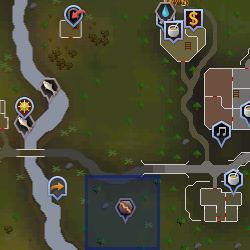
|
 Mind altar |
1 | No |
|
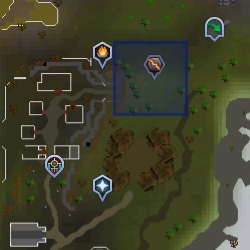
| |
 Water altar |
5 | No |
|
Al Kharid bank is the closest, just to the east of the swamp |

|
 Earth altar |
9 | No |
|
The trip takes a bit longer but you only have to walk one way which makes it faster. |

|
 Fire altar |
14 | No |
|
|
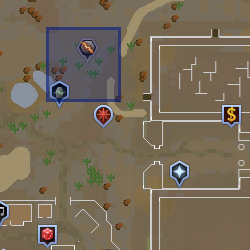
|
 Body altar |
20 | No |
|
|
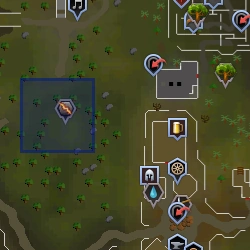
|
 Cosmic altar |
27 |
Yes (Unlocked after Lost City) |
|
Zanaris Walking time: 1min 12s* * Using the agility shorcuts is much faster. |
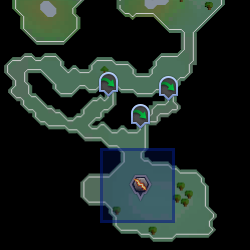
|
 Chaos altar |
35 | Yes |
|
Edgeville* / Varrock East* Walking time: ?? / 1min 50s * Edgeville route goes through mysterious ruins, Varrock route goes through Tunnel of Chaos (unlocked during What Lies Below). |
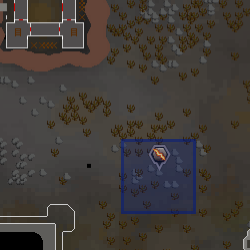
|
 Astral altar |
40 |
Yes (Unlocked after Lunar Diplomacy) |
|
Lunar Isle
|
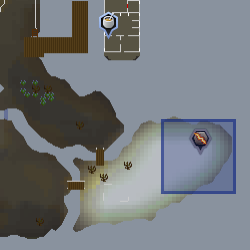
|
 Nature altar |
44 | Yes |
|
Shilo Village (unlocked after quest) Walking time: 1min 22s* * Less walking time with Spirit Graahk, Fairy ring or Amulet of Glory. |
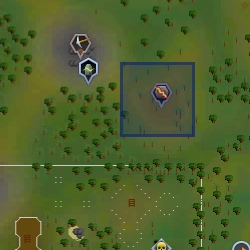
|
 Law altar |
54 | Yes |
* No weapons are allowed for entering Entrana. |
Void Knights' Outpost (via ship) / Draynor Village |

|
 Death altar |
65 |
Yes (Unlocked after Mourning's Ends Part II.) |
|
Lletya * Advised to use the Abyss instead due to time involved, or the Tirannwn quiver 3 teleport if unlocked |
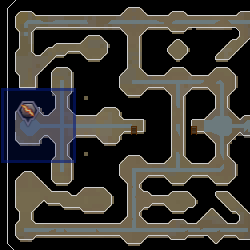
|
 Blood altar |
77 | Yes (Unlocked after Legacy of Seergaze) |
|
Burgh de Rott (After In Aid of the Myreque) or Canifis |

|
 Soul altar |
90 | Yes (Unlocked after 'Phite Club) |
Menaphos (After The Jack of Spades) |
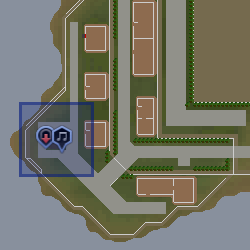
|
Cosmic, Chaos, Nature, Law, and Death runes can be crafted by non-members while dungeoneering.
Ourania Runecrafting altar
The Ourania Runecrafting altar (sometimes called the ZMI altar) converts Pure essence into a mixture of random runes (without the multiple runes factor taking effect). The altar, which requires no talisman, tiara or staff to enter, gives double the normal experience for every rune crafted. Players do not need a specific Runecrafting level in order to craft at this altar, but the chance of crafting higher-levelled runes increases with a higher Runecrafting level.
Once inside the Ourania Cave, quickly reached by an Ourania Teleport, players may use a bank that requires 20 of any type of runes. They can then go to the altar by taking either a short and dangerous route or a longer and safe route. Note that the long, curving path has no monsters that can distract you from Runecrafting. At the end of the long path, there is a crack that requires no Agility level and gives no agility experience.
| Altar | Level | Members? | Location | Closest bank | Picture |
|---|---|---|---|---|---|
| Ourania Runecrafting altar | 1 | Yes |
|
Eniola (uses 20 runes as a banking fee [many suggest Mind Runes as they are a cheaper resource]) Lunar Isle
|

|
Abyss
Members can also be teleported inside the ruins by using the Abyss, a 'focal point' leading to most altars that does not require a talisman, tiara or talisman staff. After a miniquest, players can get teleported to the Abyss by the Mage of Zamorak at level 5-6 Wilderness north of Edgeville. Once teleported, players will be in an outer ring, have all prayer points drained, be skulled, and surrounded by abyssal monsters. They will need to pass through an obstacle to access the inner ring, containing the entries to most altars (except the Astral and Ourania altars).
Crafting runes
When a player has entered the mysterious ruins with a tiara, a talisman, or runescrafting staff, all they have to do is click on the altar. They will then craft all the essence in their inventory, pouches, ethereal body, and essence stored into their familiar into runes.
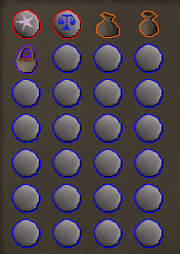
Red - Teleportation Runes back to Lunar Isle. Orange - Pouches to hold extra essence (15 above). Purple - Space saving food (strawberries) for Suqah attacks. Blue - Pure Essence
| Rune | Pure essence needed? | Level[1] | XP | Ourania altar XP | GE Price | Members |
|---|---|---|---|---|---|---|
| No | 1 | 5 | 10 | 90 | No | |
| No | 1 | 5.5 | 11 | 19 | No | |
| No | 5 | 6 | 12 | 25 | No | |
| No | 9 | 6.5 | 13 | 18 | No | |
| No | 14 | 7 | 14 | 159 | No | |
| No | 20 | 7.5 | 15 | 48 | No | |
| Yes | 27 | 8 | 16 | 412 | Yes | |
| Yes | 35 | 8.5 | 17 | 152 | Yes | |
| Yes | 40 | 8.7 | 17.5 | 415 | Yes | |
| Yes | 44 | 9 | 18 | 405 | Yes | |
| Yes | 54 | 9.5 | 19 | 570 | Yes | |
| Yes | 65 | 10 | 20 | 232 |
Yes | |
| Yes[2] | 72 | 10 | 326 | Yes | ||
| Yes | 77 | 10.5 | 21 | 678 | Yes | |
| Yes | 90 | 220 | 22 | 1,345 | Yes |
Crafting soul runes
For a long time, the only way was via the random effect of the Ourania Runecrafting Altar. Now, the soul altar is accessible after the 'Phite Club quest, requiring significant progress in Menaphos to unlock.
The process of crafting soul runes is different. The altar must be charged with four pure essence, taking five seconds. The altar holds up to 100 charges. Each charge can create one soul rune. Although runes are created slowly, it is a high-xp training method offering 220 XP per rune.
Crafting multiple runes
- For calculations of profit / loss from crafting multiple runes, see the Multiple Runes calculator.
At higher Runecrafting levels, players are able to craft multiple runes from a single piece of rune or pure essence. However, this does not translate to increased experience. This is because experience gained from runecrafting is on a per-essence basis, regardless of how many runes are crafted per essence.
The number of individual runes a player can craft increases as their runecrafting level increases, but is very specific to each different rune. Even the most experienced player will almost never double craft a blood rune. As a player's Runecrafting level gets closer to the level required for the next sequential multiple runes crafting level, the player's probability of crafting that multiple of runes will increase linearly up to about a 60% chance to create an extra rune.
After the last set level of multiple runes, players will always craft that multiple, for example, members will always craft double Nature runes after 91 Runecrafting, and will not create triple Natures. For Law, Death and Blood runes, the level for double runes would lie above 99, but there is still a chance of crafting double runes, the probability of doing so increasing towards 60% as your level increases, but only reaching a fraction of that probability. A table showing the set levels of multiple runes follows.
Prior to an update on 17 November 2009, players could only craft multiple runes after reaching the set levels. Levels over 99 are only possible when using potions or role boosts when Dungeoneering. The only boosts outside of Dungeoneering that can boost high enough is an Orange Spicy Stew which can give -6 to +6 boost. -5, -6, +5 and +6 are very unlikely. Alternatively, Advanced pulse cores have a chance of granting a +7 boost.
| Rune | Level for 1x | Level for 2x | Level for 3x | Level for 4x | Level for 5x | Level for 6x | Level for 7x | Level for 8x | Level for 9x | Level for 10x |
|---|---|---|---|---|---|---|---|---|---|---|
| Air | 1 | 11 | 22 | 33 | 44 | 55 | 66 | 77 | 88 | 99 |
| Mind | 1 | 14 | 28 | 42 | 56 | 70 | 84 | 98 | 112 | - |
| Water | 5 | 19 | 38 | 57 | 76 | 95 | 114 | - | - | - |
| Earth | 9 | 26 | 52 | 78 | 104* | - | - | - | - | - |
| Fire | 14 | 35 | 70 | 105* | - | - | - | - | - | - |
| Body | 20 | 46 | 92 | - | - | - | - | - | - | - |
| Cosmic | 27 | 59 | 118 | - | - | - | - | - | - | - |
| Chaos | 35 | 74 | - | - | - | - | - | - | - | - |
| Astral | 40 | 82 | - | - | - | - | - | - | - | - |
| Nature | 44 | 91 | - | - | - | - | - | - | - | - |
| Law | 54 | 110* | - | - | - | - | - | - | - | - |
| Death | 65 | 131* | - | - | - | - | - | - | - | - |
| Armadyl | - | - | - | - | - | - | 72 | 77 | 88 | 99 |
| Blood | 77 | 154* | - | - | - | - | - | - | - |
- |
- You can make more runes per essence if you boost your Runecrafting level. Outside of Daemonheim, you can boost your Runecrafting level by a maximum of 6 from spicy stews, or 7 from advanced pulse cores, and inside Daemonheim, you can boost your Runecrafting level by a maximum of 12. A Ring of kinship (artisan) can further add up to 10 levels when crafting multiple runes.
- At level 104 (requires Runecrafting boost), 5 Earth runes per essence are guaranteed
- At level 105 (requires Runecrafting boost), 4 Fire runes per essence are guaranteed
- The 2x levels for Law, Death, and Blood runes are used to calculate the rate of crafting above their minimum level.
Combination runes
Members can craft combination runes which are a fusion of two of the elemental runes in a single rune. The combinable elemental runes are limited to: Air, Water, Earth and Fire runes. Players cannot, for example, combine a fire and a nature rune, nor can any combination of non-elemental runes, such as cosmic and death, be made.
It is a complex process, requiring:
- A selected type of elemental runes (air, water, earth, fire, or a mix if desired)
- One matching talisman for every elemental rune type brought. (If the player brought fire and water runes, they will need a fire and a water talisman)
- Pure essence (regular essence will not work.)
One pure essence is used per combination rune crafted, so the amount of Pure Essence brought should equal the number of runes brought. The usual maximum inventory is 1 talisman, 26 elemental runes, and 26 pure essence. The ingredients must be brought to an opposing altar from the runes being crafted. Players must be able to enter the opposing altar of their choice, which will require either another talisman, related accessories, or usage of the abyss. Once the player has accessed the altar whose element is the desired other half of the fusion, the player must use the Runes on the altar, NOT the pure essence. If the player uses the essence on the altar, all essence in their inventory will be crafted as usual and the player will resultingly be in possession of two stacks of unfused runes. The talisman may also be used on the altar, but this may generate an interface asking about tiaras and other options, using the runes themselves completes the combination without further prompting. The result will be thus:
- The matching Talisman is consumed in the process. One talisman is used every binding, so essence withdrawn from pouches and familiars will require another talisman.
- All essence in the players inventory will be consumed.
- A number of elemental runes equal to the number of essence in the players inventory will be consumed.
- There will be a 50% failure rate in crafting the combination runes. The failed runes will simply vanish.
Function and Usage of Combination Runes
A combination rune saves inventory space when used for Certain Spells. This can also be especially useful on quests, where the players inventory is often very restricted. Mud runes are now highly sought after by members as they are an ingredient (when crushed) in a high level Herblore potion, but are also a common drop in decent quantity from various monsters. Runes which have been combined with the air element are especially useful in combat. Also, each combination rune counts as two separate runes, when applicable. For example, a Lava Rune will count for both 1 earth and 1 fire rune in any spellcast which uses these runes simultaneously. However, if a player casts a spell which only uses a fire rune and not an earth rune, the combination rune will still be expended. Combination runes have usage priority over basic runes. As an example, if a player were to withdraw and utilise the runes to cast the spell Teleport to Varrock with a stack lava runes in their inventory, they would find that they had accidentally used one of their lava runes and still be in possession of the single fire rune required to cast the teleport.
The Necklace of Binding
The Necklace of Binding is crafted through a combination of the Crafting and Magic skills, and is tradeable. It is an Emerald Necklace, which is crafted from an Emerald and Gold Bar, which has been enchanted using the Level-2 Emerald Enchant spell. If this item is worn while crafting combination runes, players will be rewarded with a 100% success rate for each combination rune. However, each Necklace of Binding will function only 15 times before dissolving into dust, at which point it will need to be replaced. The counter related to charges is player specific, and not connected to the item. If a player were to attempt to sell a necklace, which they believed to have 1 usage left, and purchase a replacement, the replacement will still function as if it only has one usage, and will dissolve upon the next crafting. Conversely, the player which purchases the mostly used necklace will find that it will function as many times as their individual charge counter dictates.
When a charge is used, or the necklace breaks, the player will receive a notification in the chat window, which is easy to miss. Players are advised to pay careful attention to these messages or they will be unpleasantly surprised by an unexpected and abrupt return of the 50% failure rate if they continue to craft and do not realise that they have lost the necklace. As such, players planning on mass crafting combination runes will want to have a small stock of these stored in their bank, in plain sight.
Magic Imbue
Members with 82 Magic and Lunar spells may cast Magic Imbue to negate the need to sacrifice a talisman for 12 seconds. As usual, bringing pure essence and opposing elemental runes to the appropriate elemental altar is still required to craft combination runes.
The spell saves a significant cost, as the runes to cast it are cheaper than most elemental talismans, especially when casted with a Steam battlestaff. Another benefit is that it yields a fair amount of Magic experience while training runecrafting.
However, the spell does not save inventory space as the player needs to carry Astral runes instead of a talisman, and so it does not make the runecrafting process more efficient.
The recommended inventory for players intending to use this method is:
- A Steam Staff
- Omni-tiara, or one of the four Elemental Tiaras (Air, Water, Earth or Fire.)
- A sizable stack of Astral Runes. (2 for every binding run)
- A sizable stack of Elemental Runes (Air, Water, Earth or Fire) in denominations of 26.
- 26 Pure Essence
- A Necklace of Binding (to increase the chance of binding runes from 50% to 100%)
List of Combination Runes and Experience rates
It is possible to craft each type of combination rune at two separate altars, however doing so would require inverting the elemental ingredients. Players will receive less experience if they chose to craft at the lower-levelled altars. For example if a player makes Mist runes at the Air altar they will receive 8 experience for each mist rune made, while crafting at the Water altar will give 8.5 experience for per mist rune. The following list reviews both the components and exp. rates of the different combination runes. The 'Low' list relates the experience from crafting at the lower-level altar, the 'High' list relates the experience if crafting at the higher-level altar.
| Rune | Replaces | Low | High | Combination | Elemental | Difference | |
|---|---|---|---|---|---|---|---|
| 6 | 8.0 | 8.5 | 1163 coins | 115 coins | 1048 coins | ||
| 10 | 8.3 | 9.0 | 985 coins | 108 coins | 877 coins | ||
| 13 | 9.3 | 9.5 | 868 coins | 43 coins | 825 coins | ||
| 15 | 8.5 | 9.5 | 1011 coins | 249 coins | 762 coins | ||
| 19 | 9.3 | 10.0 | 999 coins | 184 coins | 815 coins | ||
| 23 | 10.0 | 10.5 | 966 coins | 177 coins | 789 coins | ||
| Exp. from type of altar | G.E. price | ||||||
Bonuses
Abyssal familiars
These special Beasts of Burden are the only ones capable of carrying unnoted rune or pure essence, but cannot hold any other kind of item. There are three: the Abyssal parasite, Abyssal lurker and Abyssal titan, able to hold 7, 12 and 20 essence respectively. They aid runecrafting by increasing the inventory size of the player, though some are also quite combat capable. They are not allowed onto Entrana and may not be used when law runecrafting.
| Image | Familiar | Time (min) |
Pouch cost |
Can carry | |
|---|---|---|---|---|---|

|
Abyssal parasite | 54 | 30 | 4,052 coins (update) | 7 essence |
| Abyssal lurker | 62 | 41 | 5,536 coins (update) | 12 essence | |

|
Abyssal titan | 93 | 42 | 10,359 coins (update) | 20 essence |
Achievement diary rewards
These must be equipped to confer their benefits. Superior versions work in place of lower-tiered versions.
| Item | Benefit |
|---|---|
| 15% more runes from the Ourania Altar, for no additional experience. | |
| 10% chance of an extra rune per essence at the Air, Water, Earth, or Fire altars. | |
| Three daily charges that restore 50% run energy. | |
| 10% chance of an extra rune per essence at the Blood altar. | |
| 50% chance for blood altar teleports to not be lost on use. | |
| Five daily Death Altar teleports. | |
| Infinite Edgeville teleports, useful for Abyss runs. | |
| The Mage of Zamorak may teleport the player to the Abyss' centre, bypassing the outer ring. |
Master runecrafter robes
Master runecrafter robes are an experience-boosting set that may be purchased using minigame tokens from either The Great Orb Project, RuneSpan, or thaler currency. The set consists of four pieces - a hat, robe, skirt and boots - each piece provides a 1% stackable experience boost across the board, and wearing the full set raises this to 5% in total. Unlike the regular runecrafter robes, this set is members only. Most players need 20+ hours to acquire enough currency from their minigame of choice.
Ethereal outfits
There are four sets of ethereal outfits, all crafted from Rune ethereal fragments after these have been discovered through the Invention skill.
Wearing all five parts of the Blood, Death, or Law outfits will provide the following bonuses:
- Gives the ability to move between areas in the Runespan without rune cost, although you must still meet the requirements for a given type of platform.
- 5% chance to double your runes when siphoning in the Runespan, giving twice as much experience.
- 25% chance for your rune pouches to not degrade while runecrafting.
- The set body can store 6 Rune essence or Pure essence.
- Uses Master runecrafter robes' bonus experience if owned, even while the set is in the bank or player-owned house.
- Uses Wicked robes' effects if owned, even while the set is in the bank or player-owned house.
- The set head acts as a Wicked hood if owned. If robes are stored the the player owned house, another hood must be obtained from Tam McGrubor
- The set legs work as the Morytania legs 2 or higher if owned when creating blood runes at the blood altar.
- The ethereal body and legs grant a weight-reducing effect when worn, -9.5 kg and -7.5 kg respectively, since the 3 November 2014 update.
All three outfits can be combined into the Infinity ethereal outfit which provides the following bonuses
- Five daily teleports to the Yellow wizard within the Runespan and back.
- Gives the ability to move between areas in the Runespan without rune cost, although you must still meet the requirements for a given type of platform.
- 7% chance to double your runes when siphoning in the Runespan, giving twice as much experience.
- 50% chance for your rune pouches to not degrade while runecrafting.
- The Infinity ethereal body can store 12 Rune essence or Pure essence.
- Uses Master runecrafter robes' bonus experience if owned, even while the set is in the bank, player-owned house, or keepsaked.
- Uses Wicked robes' effects if owned, even while the set is in the bank or player-owned house.
- The Infinity ethereal head will act as a Wicked hood if one is in the bank or player-owned house, and only while wearing whole infinity ethereal outfit.
- The Infinity ethereal legs will work as the Morytania legs 2 or higher if owned when creating blood runes at the blood altar.
- The ethereal body and legs grant a weight-reducing effect when worn, -9.5 kg and -7.5 kg respectively, since the 3 November 2014 update.
Pouches
Within the Abyss as well as the Abyssal Area (which are separate locations), monsters drop untradeable pouches occasionally when killed. Players can possess only one of each type of pouch. Players must have access to the Abyss to receive pouch drops. For this, they must have completed the Miniquest subsequent to What Lies Below quest.
Players can store Pure or regular Rune essence in these pouches (but not both in the same pouch), carrying more essence per trip. The amount of essence held varies from pouch to pouch. There are five types of pouches, a graduated set holding an increasing number of essence. Players must acquire each smaller pouch in order for the next pouch to become available to them, except the medium pouch which is handed out at the runecrafting guild with no restrictions or quest requirement.
Runecrafting pouches degrade after several uses. Larger pouches degrade faster than smaller pouches. When a pouch degrades, a message appears in the chat box, the pouch darkens in colour, and its carrying capacity falls. The dark mage at the Abyss' centre, contactable through NPC contact, repairs pouches for free, whether the pouches are in the player's inventory or bank. He fully repairs all pouches to an unused state. The Repair Rune Pouch spell from the Livid Farm minigame will repair any visibly degraded pouches and also increase their durability.
These pouches can also be bought and repaired by Wizard Korvak in the Runecrafting Guild, but he charges rather heavily for his services. If a pouch is allowed to degrade repeatedly, it eventually falls apart entirely, and the player will have to acquire another one.
Note: Temporary boosts will not allow you to use a larger pouch than your base level.
| Image | Type of Pouch | Required Level | Essence held | Notes |
|---|---|---|---|---|
| Small pouch | 1 | 3 | Obtained from the Dark Mage and a reward from the Abyss (miniquest) | |
| Medium pouch | 25 | 6 | Dropped by Abyssal monsters; obtained from Wizard Korvak in the Runecrafting Guild for free | |
| Large pouch | 50 | 9 | Dropped by Abyssal monsters; obtained from Wizard Korvak in the Runecrafting Guild for 25,000 coins | |
| Giant pouch | 75 | 12 | Dropped by Abyssal monsters; obtained from Wizard Korvak in the Runecrafting Guild for 50,000 coins | |
| Massive pouch | 90 | 18 | Obtained from Wizard Finix outside of the Runecrafting Guild for 1,000 Runespan Tokens. |
Runecrafting gloves
There are seven types of runecrafting gloves, all rewards from the Fist of Guthix minigame. They are sold by Reggie for Fist of Guthix tokens. Runecrafting gloves provide double the experience per essence crafted. However, these gloves have a limited number of usages and will crumble to dust after crafting 1,000 essence. Players may only have one pair of each type at a time, but an unlimited number may be bought in total. The elemental rune gloves are available to free players, the other three are for members only. The bonuses stack with other experience boosters, such as master runecrafter robes.
| Gloves | Normal XP | XP with gloves | Cost | |
|---|---|---|---|---|
| 5 | 10 | 75 |
10 | |
| 6 | 12 | 75 |
20 | |
| 6.5 | 13 | 75 |
30 | |
| 7 | 14 | 75 |
40 | |
| 8.5 | 17 | 150 |
50 | |
| 10 | 20 | 200 |
92 | |
| 10.5 | 21 | 200 |
94 |
Other
Completion of Hero's Welcome grants an increase to crafted runes by 5% across the board.
A Forinthry brace prevents skulling when the Abyss is used, at the cost of a charge. Runecrafting through the abyss also gives 250% of the regular experience rates, but one is exposed to player killers, making it a dangerous option.
The demonic skull, purchased from the Mage of Zamorak, will increase all runecrafting experience gained when using the Abyss to 350% of its normal value. However, this item should be used with extreme caution, as the Wilderness level restrictions are lifted when the skull is held, meaning its user may be attacked by anyone in the Wilderness. Additionally, a number of spells and curses such as Vengeance become unavailable. Most dangerously, the owner of the skull is marked with an emblem above their head, exposing their vulnerability.
Rune running
Rune running is when a player (the "runner"), brings essence to an altar, which he/she trades to the crafter in exchange for noted essence, runes, coins, or a combination of the three. The crafters let the runners borrow their high Runecrafting levels to craft multiple (or on the case of some, single), runes from one essence. In exchange, the assisters get all of the Runecrafting experience, while the runners get many more runes than they would have gotten if they crafted the runes themselves, however they do not earn the Runecrafting experience. Rune running can be beneficial to the runner, by helping them earn money, and it can also benefit the crafter, by saving them running to the bank and back to the altar again to craft runes.
The most common kinds of rune running used to be nature rune running, law rune running, and air rune running. However, rune running existed for chaos, mind, and water runes.
Ever since the release of Runespan and the Demonic skull, rune running has decreased in popularity because of the increase in training methods.
World 36 is the official world for rune running and the Ourania altar.
Runecrafting Guild
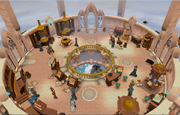
The interior of the Runecrafting Guild.
The Runecrafting Guild is a guild accessible to players having at least level 50 Runecrafting through a teal portal on the top floor of the Wizards' Tower.
The Guild features a map of all the Runecrafting altars that are entered through mysterious ruins, wizards, and a two-party minigame called The Great Orb Project with rewards including the Talisman Staff, Runecrafting Teleport Tablets, Rune or Pure essence, the various sets of Runecrafter Robes, and Talismans. The runecrafting guild is the location where players may obtain an Omni-talisman. Also Wizard Korvak sells and repairs the various pouches, and will give the player a medium pouch for free, without having to complete any of the related quests. If a player owns and uses a Runecrafting Guild Teleport Tablet, they are able to access the Runecrafting Guild without 50 Runecrafting; this can be abused by players that have been reset due to bots used on the account.
Temporary boosts
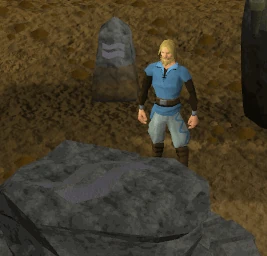
The old animation of crafting runes.
There are four regular boosts available to members. None of these boosts stack.
- For up to +5, players may eat orange spicy stews from Evil Dave to get a random boost between -5 to +5.
- For up to +2, after completing the Land of the Goblins quest, players can speak to Oldak using the "What have you discovered?" chat option to get a random boost to either Runecrafting or Magic between -2 and +2.
- For +1, at level 99, players can wear and operate the Runecraft cape.
- For +2, complete the skill tasks for any god emissary and activate the god banner's skill boost; the boost will persist for half an hour.
- Rose essence truffles give a +2 boost but are of limited availability.
- Advanced pulse cores (also of limited availability) have a chance of granting a +7 boost.
Other uses
- 90 Runecrafting is required to attract Zu Zu The Occultist to the Player-Owned Port
- 90 Runecrafting is required to unlock the ability to create the Seasingers robe set in the Player-Owned Ports distraction & diversion.
- 92 Runecrafting is required to unlock the ability to create the Seasinger kiba and Seasinger makigai dual-wield magic weaponry in the Player-Owned Ports distraction & diversion.
- Craft Tectonic armour, starting at 91 Runecrafting.
99 Runecrafting, 120 Runecrafting, and 200M xp
![]()
![]()
![]()
![]() Once a member has reached level 99 Runecrafting, Larriar in the Runecrafting Guild will sell the Runecraft cape for 99,000 coins. She will also sell the Runecraft master cape at the virtual level of 120.
Once a member has reached level 99 Runecrafting, Larriar in the Runecrafting Guild will sell the Runecraft cape for 99,000 coins. She will also sell the Runecraft master cape at the virtual level of 120.
- After completing Rune Memories, the title Archmage [Name] can be unlocked from Archmage Sedridor with 99 Magic and Runecrafting.
- Before the Dungeoneering update, Runecrafting was one of only 4 skills where a new feature or ability is unlocked at level 99 (the ability to craft 10 Air runes per Essence, without an Explorer's ring) - other than buying a skillcape, the other three being Summoning, Smithing and Construction.
- Runecrafting was previously the only remaining skill in which no player had earned 200M experience. However, on 1 December 2010 Phoenix Odin became the first player to achieve 200M Runecrafting experience.
- A bug on 14 April 2010 lead to an exponential increase in Runecrafting experience when crafting within Daemonheim (on the order of 2,000 experience per nature rune) This led to a high number of players reaching level 99 in Runecrafting within half an hour of the glitch being released, with players making 2 and 3 levels at 70+ with a single crafting session. This forced Jagex to shut RuneScape down for approximately 4 hours during which time they made a rollback of player data to before the glitch was released.
See also
- Runes
- Magic
- Runecrafting Guild and The Great Orb Project
- Wizard Hallam
- Unified Runecrafting Theory
- Free-to-play Runecrafting training, a guide to training Runecrafting for free-to-play players
- Pay-to-play Runecrafting training, a guide to training Runecrafting for pay-to-play players
- Quest experience rewards - Runecrafting
- Grand Exchange Market Watch/Runecrafting
- Runecrafting/Level up table
- Runespan
| Combat | |
| Gathering |
|
| Artisan |
|
| Support |
|
| Elite |
|
| Upcoming |
|
| Former skills |
|


